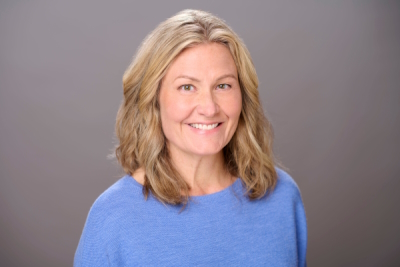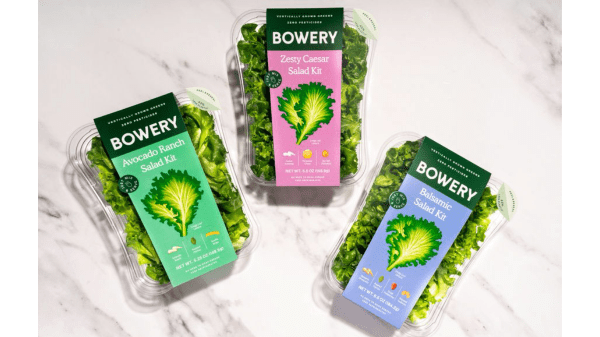It’s as certain as anything can be: vertical farming will play an increasingly important role in the future produce industry.
Katie Seawell, chief commercial officer of New York-based Bowery Farming, which specializes in vertical farming, a form of controlled environment agriculture (CEA), says that over the medium term, more of the produce category will be coming from CEA. By 2030, she says, it could account for over 40 percent of the leafy greens industry in the U.S.

Vertical farming has a huge amount to offer: it doesn’t need much land, water can be applied extremely efficiently, and pesticide-free produce can be delivered to market in 48 to 72 hours. It’s “the new gold standard in produce,” Seawell says.
“We’re collapsing the supply chain into a single site,” Seawell points out—a big advantage at a time when supply chains are looking very fragile.
Currently, Bowery is focused on leafy greens.
It’s recently entered new terrain in launching salad kits—“the fastest-growing segment” of the leafy greens industry, with a compound annual growth rate of 14 percent.
Ingredients include roasted chickpeas, pepitas, and parm crisps, but, Seawell stresses, the lettuce—Crispy Leaf, Bowery’s spin on iceberg—”is the hero.”
As fast as salad kits are growing, they remain an “underdeveloped” category in the organics and CEA space, Seawell says.
Arugula is one important focus of current development efforts: Bowery’s research facility in Kearny, NJ, got “200 kinds of germ plasms from the University of Arkansas,” Seawell says.
Bowery is moving beyond leafy greens, Seawell adds: in March, it had a limited release of strawberries in New York.
In fact, the company is developing two different strawberry cultivars: a “garden” variety, offering the best of what cultivated strawberries can deliver, and a “wild” variety, using European seed—which would be impossible to grow outdoors in this country.
Central to Bowery’s production is its intricate operating system, Seawell says, which “integrates sensors, vision systems, robotics” and can regulate the intensity of light and air flow. “We can be growing romaine lettuce side by side with butter lettuce.”
At present, Bowery has three facilities, in Kearny, NJ; Nottingham, MD; and Bethlehem, PA.
The Bethlehem facility is “our newest and most technologically advanced,” says Seawell. It is located on a site that was once used for steel production, so it is a brownfield—“a property, the expansion, redevelopment, or reuse of which may be complicated by the presence or potential presence of a hazardous substance, pollutant, or contaminant,” according to the Environmental Protection Agency.
As a result, the land could never be used for conventional farming.
Bowery, founded in 2015 and privately held, doubled its revenue in 2021-22, says Seawell; “exiting 2022, we feel we are on pace to double revenue again.”
The Fidelity fund group has come in as a lead investor, says Seawell, which she believes validates Bowery’s business strategy.
In 2021, Bowery products could be found in 600 different stores, a figure that has now grown to over 1,000. Stores served range from Whole Foods and independents to Ahold and Albertsons stores.
In 2023, Bowery plans to open additional facilities in Locust Grove, GA, and Arlington, TX, with a view to establishing a national presence.
At present, CEA lettuce remains a product for high-end specialty markets. But, Seawell says, “the farm we’ve designed, the technology we’ve developed, will get up to the price point of mainstream” produce.
CEA is “truly starting to become an industry that is scaling up to represent a larger share of market,” Seawell says.



